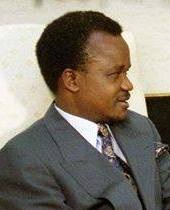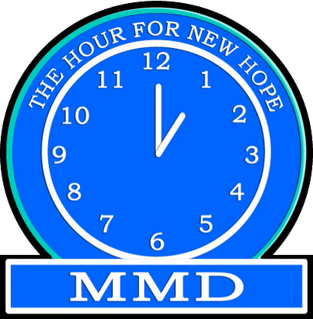Related Research Articles

The politics of Zambia takes place in a framework of a presidential representative democratic republic, whereby the president of Zambia is head of state, head of government and leader of a multi-party system. Executive power is exercised by the government, while legislative power is vested in both the government and parliament. Formerly Northern Rhodesia, Zambia became a republic immediately upon attaining independence in October 1964.

Frederick Jacob Titus Chiluba was a Zambian politician who was the second president of Zambia from 1991 to 2002. Chiluba, a trade union leader, won the country's multi-party presidential election in 1991 as the candidate of the Movement for Multi-party Democracy (MMD), defeating long-time President Kenneth Kaunda. He was re-elected in 1996. As he was unable to run for a third term in 2001, former Vice President Levy Mwanawasa instead ran as the MMD candidate and succeeded him. After leaving office, Chiluba was the subject of a long investigation and trial regarding alleged corruption; he was eventually acquitted in 2009.

Levy Patrick Mwanawasa was the third president of Zambia. He served as president from January 2002 until his death in August 2008. Mwanawasa is credited with having initiated a campaign to rid the corruption situation in Zambia during his term. Prior to Mwanawasa's election, he served as the fourth vice-president of Zambia from November 1991 to July 1994, whilst an elected Member of Parliament of Chifubu Constituency.

The Movement for Multi-party Democracy (MMD) also known as New Hope MMD is a political party in Zambia. Originally formed to oust the previous government, MMD controlled an absolute majority in parliament between 1991 and 2001, when its past leader, Frederick Chiluba was President of Zambia. Its election into power in 1991 ended the 27-year rule of President Kenneth Kaunda and his United National Independence Party (UNIP). It remained the dominant party within Zambian politics until the general elections of September 2011.

The President of the Republic of Zambia is the head of state and head of government of Zambia and is the highest executive authority in the country. The President is elected by popular vote for a five-year term and is responsible for the administration of the government, overseeing the implementation of national policies, and representing Zambia in international affairs. The office was established at Zambia's independence in 1964. The current President is Hakainde Hichilema, who assumed office on August 24, 2021, following the 2021 presidential election where his party, the United Party for National Development, won a majority. The President's role includes appointing the Cabinet, serving as Commander-in-Chief of the Zambian Defence Force, and ensuring the enforcement of laws.
Lieutenant General Ronald Shikapwasha was a military officer and cabinet official from Zambia.

The Patriotic Front (PF) is a political party in Zambia, founded in 2001 by Michael Sata. It emerged as a breakaway party from the Movement for Multiparty Democracy (MMD) after Sata was not selected as the MMD's presidential candidate for the 2001 elections. The PF is primarily supported by the youth and the urban poor, and it gained significant political influence over time.
Austin Chisangu Liato is a Zambian politician. He served as a member of the National Assembly for Kaoma Central between 2002 and 2011 and as Minister of Labour and Social Security from 2008 until 2011.

The Post is an independent Zambian newspaper. It was one of the three primary newspapers of the country. The newspaper was set up in 1991. The Sunday edition of the post newspaper was called the Sunday Post and contained a special section focusing on education called Educational Post. The Post was seen to be the most popular and biggest selling newspaper in Zambia according to BBC. The newspaper was closed in 2016 for failure to settle tax obligations in what has been described as a politically motivated move over the paper's frequent criticism of the government.

General elections were held in Zambia on 28 September 2006 to elect a President, members of the National Assembly and local government councillors. The result was a victory for the ruling Movement for Multi-Party Democracy, which won 75 of the 150 National Assembly seats and whose candidate, Levy Mwanawasa, won the presidential vote. Voter turnout was just over 70%.

Michael Charles Chilufya Sata was a Zambian politician who served as the fifth president of Zambia from 2011 until his death in 2014. A social democrat, he led the Patriotic Front (PF), a major political party in Zambia. Under President Frederick Chiluba, Sata was a minister during the 1990s as part of the Movement for Multiparty Democracy (MMD) government. He went into opposition in 2001, forming the PF. As an opposition leader, Sata – popularly known as "The King Cobra", emerged as the leading opposition presidential contender and rival to President Levy Mwanawasa in the 2006 presidential election, but was defeated. Following Mwanawasa's death, Sata ran again in 2008, losing to Rupiah Banda.

Rupiah Bwezani Banda was a Zambian politician who served as the fourth president of Zambia from 2008 to 2011, taking over from Levy Mwanawasa. Banda was an active participant in politics from early in the presidency of Kenneth Kaunda, during which time he held several diplomatic posts.
There is a small but recognisable community of Indians in Zambia. Unlike the better-known Indian communities of South East Africa, they were little-studied by historians until the 2000s.
Emmanuel Kasonde was a Zambian economist and politician who served as the Finance permanent secretary or Minister of Finance under three successive Zambian presidential administrations, including Kenneth Kaunda, Frederick Chiluba and Levy Mwanawasa.
Enoch P. Kavindele is a Zambian businessman and politician who served as the seventh vice-president of Zambia from 2001 until 2003.
Fred M'membe is a Zambian journalist known for his editorship of the Zambia Post. He has received numerous international awards for his reporting. In 2000, the International Press Institute named him one of its World Press Freedom Heroes.
Benjamin Yoram Mwila, often known as BY, was a Zambian politician and businessman. Mwila was a prominent leader and co-founder of the Zambia Republican Party. He served as an MP for Luanshya in the National Assembly. Mwila held several cabinet portfolios within the cabinet of President Frederick Chiluba during the 1990s, including Minister of Defence from 1991 to 1997.
Ronald Damson Siame Penza was a Zambian politician.
Vera Tembo is a Zambian politician and member of the Movement for Multi-Party Democracy (MMD). She served as the First Lady of Zambia from 1991 until her separation from her former husband, President Frederick Chiluba, in 2001.

Sylvia Masebo is a Zambian entrepreneur, politician, and National Assembly of Zambia representative for Chongwe constituency with the United Party for National Development (UPND). Sylvia Masebo holds a degree in Banking and Finance. She first stood on the ticket of Zambian Republican Party (ZRP) in 2001, then the Movement for Multi-Party Democracy (MMD) in 2003, then the Patriotic Front (PF) in 2011, and then the UPND in 2021.
References
- 1 2 3 4 5 OECD Forum 2005: Dipak Patel, Organisation for Economic Co-operation and Development, 2005, retrieved 20 August 2009[ permanent dead link ]
- ↑ Zambia (PDF), Foreign Relations Briefs, India: Ministry of External Affairs, 2008, retrieved 21 August 2009
- ↑ "Zambia", Africa South of the Sahara, Routledge, 2003, p. 1145, ISBN 978-1-85743-131-5
- ↑ "Zambia newspaper editor arrested", BBC News, 12 February 2002, retrieved 20 August 2009
- ↑ "Zambia's cabbage case could backfire", BBC News, 14 February 2002, retrieved 20 August 2009
- ↑ "Zambian president appoints opposition members into cabinet", Xinhua News, 8 February 2003, retrieved 20 August 2009[ dead link ]
- ↑ Bearak, Barry (20 August 2008), "Levy Mwanawasa, Zambia President, Dies at 59", The New York Times, retrieved 20 August 2009